The Sabin Family Fellows aren’t afraid to push the limits
Eight of MD Anderson’s top young researchers have been named Andrew Sabin Family Fellows and will receive $100,000 each over two years to pursue creative, independent thinking and high-risk, high-impact research.
In 2015, Andrew Sabin, of East Hampton, New York, and the Andrew Sabin Family Foundation committed $30 million to establish an endowment funding the Andrew Sabin Family Fellowship Program, which is designed to support the novel work of world-class cancer researchers in four categories: basic science, clinical, physicianscientist and population and quantitative science. Eight cancer research fellowships will be awarded each year.
“I wanted to provide a vehicle so that highly qualified researchers at the world’s premier cancer center can focus on important work that can truly help people who suffer from cancer,” says Sabin, who has served on the MD Anderson Cancer Center Board of Visitors since 2005. “I hope one of the fellows comes up with a cure. It would make me very proud to know that this gift made a difference.”
The inaugural recipients, selected among 65 applicants through a rigorous peerreview process, shared with Conquest what the fellowship means for their research …
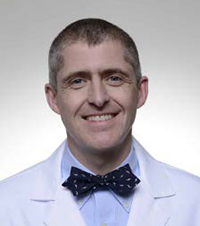
Benjamin Smith, M.D., associate professor, Radiation Oncology and Health Services Research
The Sabin Fellowship will allow me to expand my research in a novel direction by developing a project that will promote personalized decision-making for women with early breast cancer trying to decide between mastectomy and breast reconstruction or lumpectomy followed by whole-breast irradiation. This type of research is novel and would be difficult to fund via a more traditional method. The Sabin Fellowship is important because it will allow me to focus my time on conducting research — instead of writing grants — and generate data to expand this novel avenue of research.

Shannon Westin, M.D., assistant professor, Gynecologic Oncology and Reproductive Medicine
The Sabin Fellowship is providing the funding necessary to add novel endpoints to existing clinical trials. My colleagues and I are creating a platform to evaluate which patients may benefit most from therapies targeting p53, which is the most common molecular aberration in ovarian cancer and anumber of other advanced solid tumors. The potential for practice-changing findings is great.
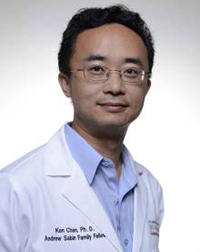
Ken Chen, Ph.D., assistant professor, Bioinformatics and Computational Biology
The Sabin Fellowship enables me to look more closely at the dark region of human genomes, to identify genetic variants such as structural variants and small insertions and deletions that cannot be identified by current technologies, but are particularly important to tumor development.
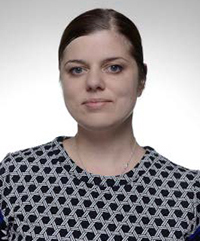
Katharina Schlacher, Ph.D., assistant professor, Cancer Biology
I came to MD Anderson because it’s an institution with a grand mission: eradicating cancer. To achieve that mission, we need research that pushes the envelope and changes how we think, and how we treat patients. The Sabin Family Fellowship understands this need and supports such out-of-the-box thinking. The fellowship will further my study of DNA replication fork protection at in-depth molecular and biological levels in order to learn more about its potential as a cancer suppression mechanism across many different cancers.
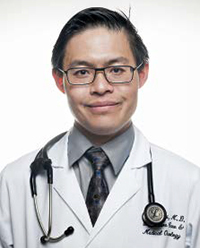
David Hui, M.D., assistant professor, Palliative, Rehabilitation and Integrative Medicine and General Oncology
The Sabin Fellowship is particularly important to my research because it enables me to conduct a high-risk, high-yield project that examines the use of a highly innovative intervention — high flow oxygen and air — to relieve shortness of breath (or air hunger) in cancer patients. This symptom is common among cancer patients, and there are few treatment options available. I am grateful for the Andrew Sabin Family Fellowship Program because instead of having to spend a lot of time writing grants, this prestigious award allows my research team to jump right into the science. This preliminary study represents a critical step toward improving the quality of life of patients living with cancer.
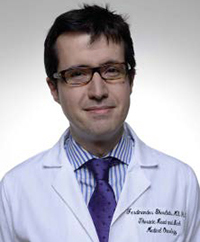
Ferdinandos Skoulidis, M.D., Ph.D., assistant professor, Thoracic/Head and Neck Medical Oncology
I am very grateful to the Sabin Family Foundation for their invaluable support at an early stage in my independent research career. This fellowship will enable me to extend my work on the role of co-occurring genetic events in KRAS-mutant lung adenocarcinoma, a prevalent and difficultto-treat molecular subtype of non-small cell lung cancer. We will specifically focus on identifying novel molecular predictors of response of KRAS-mutant tumors to immunotherapy with immune checkpoint inhibitors.
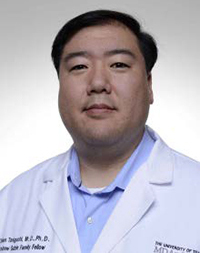
Cullen Taniguchi, M.D., Ph.D., assistant professor, Radiation Oncology
I am incredibly humbled to be named a Sabin Fellow. This award will fund an exciting project that seeks to reduce toxicity from chemotherapy and radiation treatments to improve outcomes in our cancer patients.
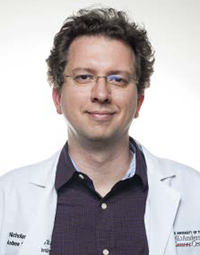
Nicholas Navin, Ph.D., assistant professor, Genetics and Bioinformatics
The Sabin Fellowship has enabled me to pursue an exciting new, high-risk research project in my laboratory. This project will involve applying single-cell DNA sequencing technologies to breast cancer patients to understand how individual tumor cells evolve resistance to chemotherapy.












